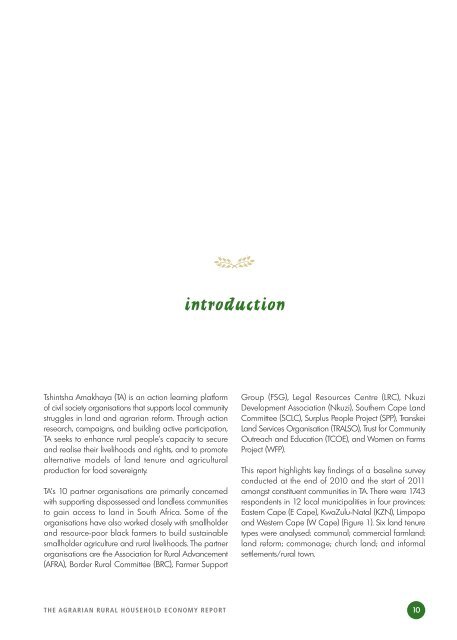THE AGRARIAN RURAL HOUSEHOLD ECONOMY
THE AGRARIAN RURAL HOUSEHOLD ECONOMY
THE AGRARIAN RURAL HOUSEHOLD ECONOMY
Create successful ePaper yourself
Turn your PDF publications into a flip-book with our unique Google optimized e-Paper software.
Tshintsha Amakhaya (TA) is an action learning platform<br />
of civil society organisations that supports local community<br />
struggles in land and agrarian reform. Through action<br />
research, campaigns, and building active participation,<br />
TA seeks to enhance rural people’s capacity to secure<br />
and realise their livelihoods and rights, and to promote<br />
alternative models of land tenure and agricultural<br />
production for food sovereignty.<br />
TA’s 10 partner organisations are primarily concerned<br />
with supporting dispossessed and landless communities<br />
to gain access to land in South Africa. Some of the<br />
organisations have also worked closely with smallholder<br />
and resource-poor black farmers to build sustainable<br />
smallholder agriculture and rural livelihoods. The partner<br />
organisations are the Association for Rural Advancement<br />
(AFRA), Border Rural Committee (BRC), Farmer Support<br />
<strong>THE</strong> <strong>AGRARIAN</strong> <strong>RURAL</strong> <strong>HOUSEHOLD</strong> <strong>ECONOMY</strong> REPORT<br />
introduction<br />
Group (FSG), Legal Resources Centre (LRC), Nkuzi<br />
Development Association (Nkuzi), Southern Cape Land<br />
Committee (SCLC), Surplus People Project (SPP), Transkei<br />
Land Services Organisation (TRALSO), Trust for Community<br />
Outreach and Education (TCOE), and Women on Farms<br />
Project (WFP).<br />
This report highlights key findings of a baseline survey<br />
conducted at the end of 2010 and the start of 2011<br />
amongst constituent communities in TA. There were 1743<br />
respondents in 12 local municipalities in four provinces:<br />
Eastern Cape (E Cape), KwaZulu-Natal (KZN), Limpopo<br />
and Western Cape (W Cape) (Figure 1). Six land tenure<br />
types were analysed: communal; commercial farmland:<br />
land reform; commonage; church land; and informal<br />
settlements/rural town.<br />
10


